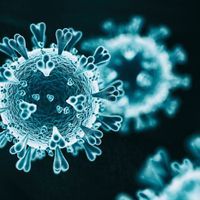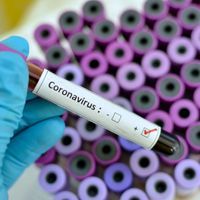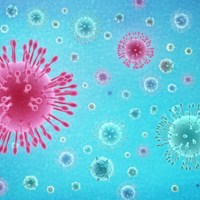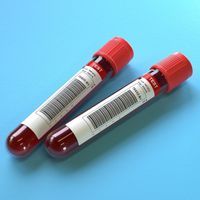Login
Subscribedisease & medicine, genetics & genomics

Alzheimer’s Gene Linked to Higher Risk of Severe COVID-19
Jef Akst | May 26, 2020 | 2 min read
Two copies of the APOE4 variant, which confers a higher risk of dementia, doubles the risk of severe symptoms as a result of infection with SARS-CoV-2, according to a study.

Paul Marks, Past President of MSKCC, Dies
Catherine Offord | May 8, 2020 | 3 min read
A cancer researcher with a talent for leadership, Marks turned the Memorial Sloan Kettering Cancer Center into one of the world’s foremost oncology research institutions.

Coronavirus’s Genetics Hint at its Cryptic Spread in Communities
Ashley Yeager | Mar 6, 2020 | 6 min read
Contact tracing and genetic testing reveal how SARS-CoV-2 circulated among individuals for weeks, especially in the US, before being detected.

Infographic: How Some X-Chromosome Genes Escape Inactivation
Amber Dance | Mar 1, 2020 | 2 min read
About one-quarter of the hundreds of genes on the inactivated X chromosome in XX cells manage to escape that silencing, at least some of the time.

Genes that Escape Silencing on the Second X Chromosome May Drive Disease
Amber Dance | Mar 1, 2020 | 10+ min read
When X-linked genes evade silencing on the “inactive” chromosome in XX cells, some protect women from diseases such as cancer, but others seem to promote conditions such as autoimmunity.

Infographic: How Does Cell Senescence Drive Aging and Disease?
Katarina Zimmer | Mar 1, 2020 | 4 min read
The accumulation of zombie-like cells seems to accelerate aging and promote aging-related disease. Researchers are trying to figure out how.

Scientists Compare Novel Coronavirus with SARS and MERS Viruses
Abby Olena, PhD | Feb 11, 2020 | 4 min read
Researchers find 380 amino acid substitutions between 2019-nCoV and severe acute respiratory syndrome (SARS)-related coronaviruses.

CRISPR-Edited Cells for Cancer Therapy Safe in Humans: Trial
Ashley Yeager | Feb 6, 2020 | 3 min read
In the first clinical study of its kind in the US, researchers used CRISPR to modify CAR T cells to make them more potent against cancer, but the clinical benefits are unknown.

Inadequate Myelination of Neurons Tied to Autism: Study
Lisa Winter | Feb 4, 2020 | 2 min read
A mouse model of autism and postmortem brains of autistic individuals showed a lack of mature oligodendrocytes and less myelination than controls.

Australian Lab Cultures New Coronavirus as Infections Climb
Jef Akst | Jan 29, 2020 | 2 min read
With more than 6,000 cases of the 2019-nCoV virus confirmed, researchers are hoping that studying the pathogen in the lab will help stop the outbreak.

Scientists Scrutinize New Coronavirus Genome for Answers
Emma Yasinski | Jan 23, 2020 | 5 min read
Researchers are trying to figure out where it came from, whether it’s evolving, and just how big a threat it will be.

Immunology Leader Vincenzo Cerundolo Dies
Ashley Yeager | Jan 16, 2020 | 2 min read
The Oxford researcher’s work on lipid and peptide antigens revealed key mechanisms in inflammation, immunotherapy, and vaccination, which are being pursued in clinical trial treatments.

Transposons Identified as Likely Cause of Undiagnosed Diseases
Jef Akst | Jan 13, 2020 | 4 min read
A tool for identifying jumping gene insertions in DNA sequencing data turns up possible explanations for four patients’ rare developmental disorders.

A New Way to Establish Cause and Effect in Epidemiology?
Rachael Moeller Gorman | Jan 1, 2020 | 7 min read
A technique called Mendelian randomization is overturning the conclusions of observational studies in public health. But researchers question whether the method can overcome its fundamental limitations.

China Sentences Gene-Editing Scientist to Three Years in Jail
Emily Makowski | Dec 30, 2019 | 2 min read
The modification of three babies’ genes by He Jiankui drew widespread criticism from scientists.

Fetal Gene Therapy Helps Mice with Spinal Muscular Atrophy
Alejandra Manjarrez, PhD | Dec 11, 2019 | 4 min read
The animals lived longer and showed milder symptoms than untreated mice, although they didn’t survive as long as wildtype mice.

Circulating Fetal Cells Sequenced for Prenatal Testing Study
Emily Makowski | Dec 10, 2019 | 3 min read
Trophoblasts, collected from the mother during a blood draw, can determine fetal genetic abnormalities currently diagnosed through amniocentesis or chorionic villi sampling.

Trial of Gene Therapy for Duchenne Muscular Dystrophy Put on Hold
Catherine Offord | Nov 12, 2019 | 2 min read
The US Food and Drug Administration halts a study by Solid Biosciences after a patient experiences severe side effects following treatment.

APOE Mutation Linked to Protection From Alzheimer’s: Case Study
Catherine Offord | Nov 5, 2019 | 2 min read
A woman whose DNA suggested she’d develop early-onset dementia staved off cognitive decline for decades.
